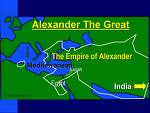 Ever since humans have been organizing themselves into groups, politics has existed. Political entities, or states, have been organized for millenia, and the way borders have been defined throughout this long history made up the most rudimentary aspects of politics. The most basic systems of self-governance, then monarchy developed over a long, bloody history into today’s complex forms of political entities including democratic and communist systems of governance. In conjunction with the development of more complex systems from the basic types has been a parallel definition of a state’s borders from frontier-type boundaries to exact, permanent and definite borders that exist currently.
Ever since humans have been organizing themselves into groups, politics has existed. Political entities, or states, have been organized for millenia, and the way borders have been defined throughout this long history made up the most rudimentary aspects of politics. The most basic systems of self-governance, then monarchy developed over a long, bloody history into today’s complex forms of political entities including democratic and communist systems of governance. In conjunction with the development of more complex systems from the basic types has been a parallel definition of a state’s borders from frontier-type boundaries to exact, permanent and definite borders that exist currently.
In ancient times civilizations did not define themselves as existing within particular, well-defined borders. From as far back as 200,000 years ago, and even until today for some cultures, people have lived in non-state societies in tribal communities. In a more complex form of organization without definite borders chiefdoms have existed for thousands of years until today. States with more well-defined borders developed about 3,000 BCE in Egypt and Sumer.
The Indian civilization born in the Indus Valley formed in about 2,500 BCE with its boundaries reaching about 600 km inland from the Arabian Sea.
More than 2,000 years later Alexander the Great conquered a large number of states and combined them into a huge empire, bringing into contact the various countries of the Mediterranean Basin with those of the southern and central Asia. Alexander’s empire extended hundreds of kilometers.
Not until the Roman Empire’s conquests from 509BCE until 476AD did a western civilization precisely define its borders. Western civilization today owes much of what it believes about governmental systems, and nationhood to the Roman ideas on the subject and the Greek city-states. Most pointedly, European states of the middle ages acquired their authority from the Roman Catholic Church, but today’s modern democracies are derived in many ways from the governmental systems of ancient Athens.